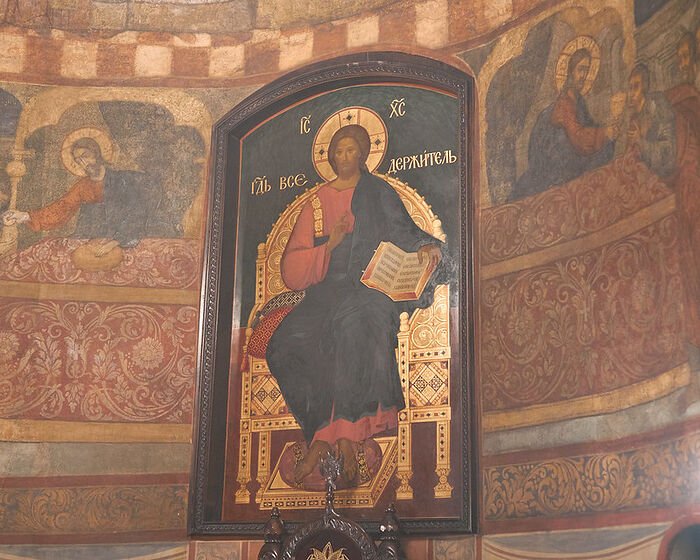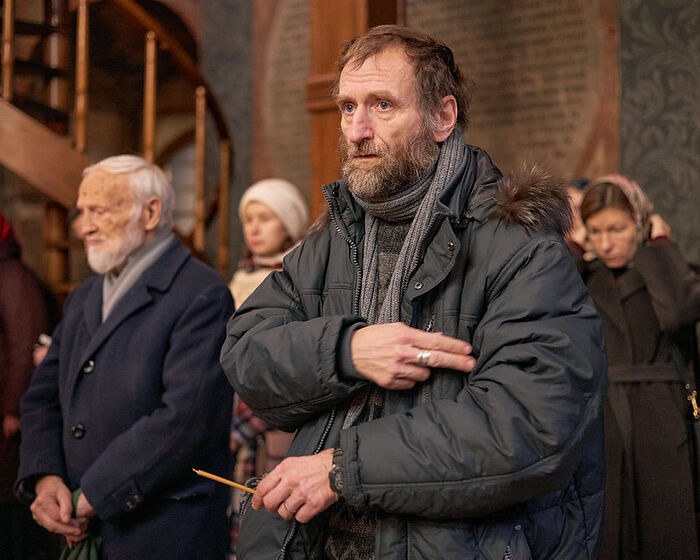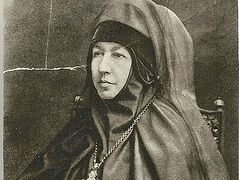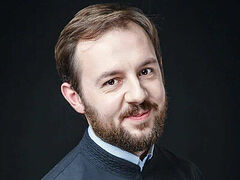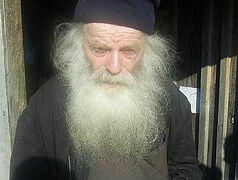Part 1. Repentance and Confession
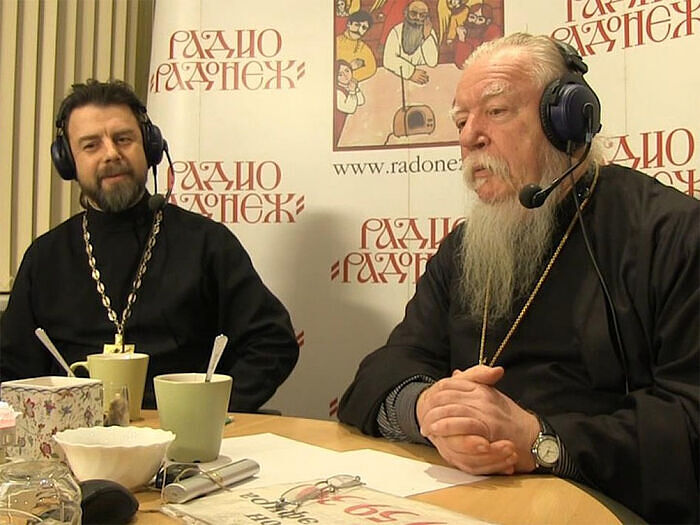 With Archpriest Dimitry Smirnov
With Archpriest Dimitry Smirnov
—People very often regard God as a Fulfiller of their wishes. They think: “I’ll pray now, and the Lord will give me something for it.” Or they think that they now will observe a fast and then wait for some gift from the Lord. We very often perceive God as a Magician. It seems to me that it is another problem. We don’t want to attain salvation and inherit the Heavenly Kingdom—we want to get everything here and now.
—You have defined the problem not only of modern man, but also of sinful man in general—to want everything at once, prosperity in this earthly life and bliss in the life to come. And people don’t want to take into consideration that sometimes these desires are incompatible. Although some people hear us, try to do something and have some results. I cannot say that everything is futile: the Church has succeeded in many aspects in recent years, especially when it began to actively interact with society in all spheres. There is very serious evidence of Russian people’s integration into Church life. Archpriest Dimitry Smirnov used to say, “We have ceased to be Russians—we have become Soviets.” Now the reverse process has begun: we are turning from Soviets into Russians again. A Russian is first of all an Orthodox believer. This process is much more difficult than what happened to our forebears when they were made Soviets from Russians. In fact, there are a lot of young people in our churches now. Not only old men and old women, but young people and families with children come, pray sincerely and strive to live according to the commandments of God. Not everything works out right away, but they make efforts. Many people are interested in spiritual things. But the trouble is that we were brought up in a completely different tradition. Over those seventy years, the Soviet Government destroyed the traditions of educating an Orthodox Christian. We have no foundation. We try to be guided by the books and instructions of people who lived in those days. the living tradition, when grandparents could pass on to their children and grandchildren some traditions of Orthodox upbringing that they had themselves been raised in, was interrupted and we were deprived of all this. Now people have to learn many things from scratch. There used to be many generations of priests in the same family, and this tradition was also interrupted (today we have few such examples). In our days we have new priests: although they are usually well-educated, they have not yet developed the tradition of spiritual guidance and pastorship. These traditions are slowly being revived and, thank God, there are some good results.
—Father, in the course of our talk I have been trying to expose modern man, but you have been trying to cover him with love. It seems you are so kind to anyone who comes to confession. Contemporary people lack this love. We all strive to achieve something, but we do not long for the most important thing—salvation. We want something momentary, and there is no love in us. Do you have the impression that our ego prevails over everything else?
—People are very different. It happens that someone has come to confession, and at the same time he begins to judge others. He is seething with resentment. Or he mentions someone else’s sin instead of his own. Here it is necessary to stop and help him. You should say, “Son, you don’t know what you’re saying at all.” And he really does not know; he is still not in the habit of thinking otherwise. We are so used to living in a state of indignation and general discontent that we simply can’t think otherwise. The devil has infected people with the spirit of indignation, judgmentalism and general discontent. People are always dissatisfied with everything. They are content very seldom and for a very short time. We should bring a person out of this state, helping him see himself in that situation. He is still unable to do it. What we can see as outsiders cannot always be seen by a person himself. It is also a question of time.
—It is very noticeable if you go online: everyone deems it their duty to speak out even under a very innocent message and prove their points of view. Even when you read Orthodox publications and watch videos, human anger goes beyond all limits. Everyone should say that he is more humble than everyone else. Isn’t that also a feature of modern society?
—Yes, it is, because the devil has been very successful in instilling malice in people. People are angry, they condemn and suspect others. Such a person, infected with this serious “virus”, comes to church and speaks, thinks and communicates the way he is used to. It’s good if he knows how to say a few denunciatory words about himself, because in fact, pride does not allow us to accuse ourselves of anything. People would rather justify any of their actions than admit their guilt. Of course, such a person sees only negativity in any comment on the internet and gets infected with it. And then he comes to church, and there everything should be done differently—it’s very hard.
—What can help a person in his fight against imposing himself and his own opinion? How we we foster humility?
—First you should understand that man cannot do it on his own—he needs help from the One Who possesses everything and to Whom everything is subject—from God. And we should ask God to help such people. Everything begins with the recognition of one’s weakness and God’s omnipotence and turning to Him. The Lord will certainly give a person His hand so that he can continue walking the path of repentance. He must first admit that he needs healing. Sometimes a person is told that he should see a doctor, but he argues that he needs no doctor and he has no signs of illness. It is impossible to heal such a person. So first he must understand that he is sick, that there is a lot of irritation, anger and resentment towards everyone in him. When a person self-diagnoses, realizing that he needs help. He understands that hospitals do not treat this and he says at confession: “I get annoyed a lot, I get angry, I have depression from this, and I do not understand what is happening to me.” And the priest helps him see himself and self-diagnose. He says, “Let’s pray together and ask the Lord for help. And be sure to come on Sunday—I’ll give you Communion.” He comes, takes Communion and begins to feel better. He will definitely say: “How great! Life may not be as wretched as I used to think!” And he gradually starts attending church. We priests help such people as much as we can.
—It is hard for modern man to ask. He’s so “smart”, he has various types of gadgets and technology. It’s very hard for him to admit that he can’t do anything without God.
—God helps a person to grow up to this. Every day people come to church and say that they are at confession for the first time or have not been for a long time. But they come! If we take all the churches in Moscow, we will have plenty of people who have turned to Christ. And all over Russia and every day! In fact, not everyone turns to God simultaneously. We can’t even receive everyone at once. If everyone was suddenly to decide to repent simultaneously, even a church yard would be not enough for everyone, not to mention the limited church space.
—Do you have the impression that our faith is not built on the rock? Once trials and tribulations befall us and the Lord tests us, we immediately say to Him, “How is it? I went to church, kept fasts, prayed and took Communion, but You have sent me such a trial!” If not everything turned out the way we wanted, our faith can be shaken.
—Yes! We lack faith, but there is nowhere to go except the Church. No matter how hard it is, you will not get full consolation anywhere else, so even people who have fallen into utter despondency, as a rule, do not leave the Church. In general, very few walk away from the Church, at least from our Orthodox Church. Yes, it’s tough, but there’s nowhere else to go. There is not enough faith, but we make efforts, get strength in it, support each other, and pray.
—Are you often asked such questions: “I have hardships in life, what were they given to me for?”? Are there people who really understand the essence of what is happening to them?
—Most people understand this and think, “What sin did I commit?” They realize that they may have sinned in the past. People often say: “Father, there must be some forgotten sin I haven’t repented of.” After all, people understand that their current difficulties can be connected with their former sinful lifestyle. Well, he who seeks finds. The Lord either points to some sin a person has never repented of or shows that trials were not sent him for his sin, but for the glory of God. Do you remember the episode about the healing of a man who was blind from birth? Jesus answered His disciples: Neither hath this man sinned, nor his parents: but that the works of God should be made manifest in him (Jn. 9:3). After reading this episode from the Gospel people begin to regard their problems as something that was allowed to happen and will lead to the glory of God.
—What do you consider to be the main spiritual problems of modern man? What saddens you the most? What problems do people come to church with most often?
—The most important problem of modern man is that he no longer needs God. People want an earthly kingdom, earthly prosperity and Paradise. And they don’t need God as He revealed Himself to us. People don’t want to get sick, to suffer or endure any difficulties. The Apostle Paul said, we must through much tribulation enter into the Kingdom of God (Acts 14: 22). But man does not want sorrows or difficulties.
What do you think people regard as the most important thing in life? What is the main toast at any feast? To good health! It can be heard every time. This is the main issue. People don’t seek God, but earthly comfort. If they start longing for God, God will give them everything they need. He will enlighten, teach them, help them understand the Holy Scriptures, prolong their lives and give them strength.
—Are these also remnants of the Soviet worldview, referring to the words of Father Dimitry Smirnov? That we want to eat delicious food and sleep like a baby here and now, and not suffer.
—Not everyone in the world was Soviet, but absolutely everyone in the world seeks this earthly comfort today (for example, the Chinese and the Americans who have never been Soviet). It’s the work of a destructive spirit in the world, it’s attachment to the earthly, comfort and well-being. People do not want, for the sake of God, and are not ready, to bear any discomfort, let alone suffering.
—You’re talking about health. I also noticed that when you wish someone, even a church-goer, the Heavenly Kingdom, he believes that you are going to bury him.1
—Yes, people always associate this with the funeral service. Nothing doing. We generally have a cautious attitude towards such wishes.
—Concerning the fact that the earthly prevails over the spiritual: how to deal with it? To force myself to think about what will be later, and not about how good it will be now? What will help from a practical point of view?
—Faith will help. If there is no faith, then nothing will help. And if there is faith, we must act according to our faith. We must listen to Christ, read His commandments carefully and apply them to our lives. Yes, it will require efforts and self-improvement; but he who sets himself such a goal will succeed with the help of God. Without Me ye can do nothing (Jn. 15:5). So it is. Without God we cannot even pray to Him. No good deed for Christ’s sake can be performed without Christ.

